Date: 17 February 2010
The volume of orders received grew 26% compared with the previous quarter.
- Glaston's order book on 31 December 2009 stood at EUR 45.5 (62.5 million.
- Consolidated net sales totalled EUR 151.8 (270.4) million. Final quarter net sales totalled EUR 35.8 (68.9 million. - The operating result was a loss of EUR 55.3 (6.1 loss) million, i.e. -36.4 (-2.3)% of net sales
- The operating result excluding non-recurring items was a loss of EUR 33.6 (6.2 profit) million, i.e. -22.2 (+2.3)% of net sales. The final quarter operating result was a loss of EUR 11.0 (0.3 loss) million, i.e. -30.8 (-0.4)% of net sales. - Non-recurring items of EUR -21.6 (-12.3) million were recognised for the full year, and EUR -17.3 (-12.3) million in the final quarter.
- Return on capital employed (ROCE) was -32.1 (-2.3)%.
- Earnings per share were EUR -0.68 (-0.12), of which the final quarter contribution was EUR -0.34 (-0.16).
- The Board of Directors proposes to the Annual General Meeting that no dividend be distributed.
- Due to efficiency measures already implemented, Glaston starts 2010 on a better foundation and expects 2010 net sales to be at least at the 2009 level and the operating result to significantly improve.
President & CEO Arto Metsänen:
2009 was very difficult for Glaston due to the economic recession. Demand for glass processing machines was at an exceptionally low level and net sales declined sharply.
The emphasis of machines was on sales of single machines. Demand for more extensive deliveries and solar energy investments was weak and projects were postponed to a later date. In a difficult market situation, the Services segment performed relatively well, however.
During 2009 efficiency measures initiated in late 2008 were continued. In addition to these an extensive adjustment programme was initiated in the final quarter of 2009 and the employee negotiations were completed by the end of December. We will adjust our production capacity, optimise our product range and simplify the structure of our sales organisation. The agreed measures will cut Glaston's workforce at most by around 400 employees.
Thanks to the efficiency measures performed, we begin 2010 on a better foundation. Our current production structure provides us with a good starting point. We are strengthening our production in China and are investing in developing both technical and sourcing expertise. In the early part of the 2010, the emphasis will be on completing the efficiency improvement programme.
New segment information
On 22 April 2009, Glaston announced that it was changing its organisation, and the reportable segments are now Machines, Services and Software Solutions.
The Pre-processing and Heat Treatment business areas have been combined to form the Machines segment. At the same time, maintenance and service business was separated from machine operations into its own Services segment.
The Machines segment comprises tempering, bending and laminating machines sold under the Tamglass and Uniglass brands, glass pre-processing machines sold under the Bavelloni brand, and tool manufacturing. The Services segment consists of glass processing machine maintenance and service activity, sales of spare parts and tools, and the operation of the glass processing factory in Akaa, Finland, as a service activity on behalf of a customer. The Software Solutions segment includes enterprise resource planning systems for the glass industry and sold under the Albat+Wirsam brand.
The geographical areas reported quarterly are, EMEAI (Europe, Middle East, Africa, India, Pakistan and Bangladesh), Asia and America.
Markets
In 2009 the economic recession strongly influenced demand for glass processing machines and the market situation was extremely difficult throughout the year. Glaston's markets in different countries developed unevenly during the year. As the European, Middle Eastern and North American weakened further, positive development was perceptible in the South American and Chinese.
Machines
Despite a weakening of demand, the Machines segment maintained its market position in 2009. Owing to the challenging market situation, price competition intensified during the year, particularly with respect to Asian competitors.
Demand for glass processing machines weakened significantly in all market areas, except for South America, where demand remained high throughout the year. In Central Europe, demand in the German market stood out positively from the rest of the EMEAI area. At the end of 2009, a gradual recovery of the market was also evident in the Asian and Australian markets. Particularly in the Chinese market, recovery of the architectural glass segment was accelerated by local stimulus measures initiated during the year.
Demand for solar energy glass solutions weakened as customers postponed decision-making on projects due to economic uncertainty and financial market instability. Demand for comprehensive (One-Stop-Partner) deliveries was very low and the emphasis on machine sales was on single machines.
In 2009 efficiency improvement played a key role in developing the operations of the Machines segment. An efficiency programme initiated in 2008 continued and, additionally, new cost-cutting programmes were launched, which included significant personnel reductions in Finland and Italy. Moreover, the product portfolio was rationalised and machine production location arrangements effected by transferring the focus of production and sourcing more towards China. The measures were more extensive on the pre-processing technology.
Orders received in the Machines segment totalled EUR 88.5 (144.4) million in 2009. January-December net sales totalled EUR 82.2 (168.5) million.
Services
In 2009 the Services segment's strongest market areas were Germany, Brazil, Australia and New Zealand. In the EMEAI area demand for maintenance services and upgrades slowed down except for Germany and the UK. The Middle East was quieter than expected. Demand in the APAC area declined, except for Australia and New Zealand. In the United States demand was subdued.
The economic recession negatively impacted customer demand, particularly in the solar energy, architectural and automotive glass segments. Lower utilisation rates of glass processing machines reduced the need for spare parts. The outsourcing trend initiated in previous years came to a halt.
Although market demand weakened, even so the volume of the Services segment's service contracts and maintenance work grew and demand for training services clearly increased. Demand for spare parts fell significantly, however. There was greater emphasis on machine modernisations as glass processors focused on machine upgrades instead of new investments. The modernisations were related to energy-saving, automation systems and technology upgrades. At the end of the year, there was also increased demand for modernisation related to boosting performance and improving the quality of architectural glass.
In 2009 the significance of geographical areas and operating close to the customer was highlighted. Orivesi upgrade production was transferred to Tampere and the integration of Uniglass machine maintenance into the rest of the service organisation was completed. A servicing point for Bavelloni machines was established in the Middle East and a new distribution centre set up in Cinnaminson, USA.
Orders received in the Services segment totalled EUR 42.8 (72.3) million in 2009. January-December net sales totalled EUR 48.1 (76.0) million.
Software Solutions
In 2009 Software Solutions improved its market position in Europe due to strong demand from medium-sized companies. Although demand among international operators generally declined, medium-sized companies invested strongly in renewing their production processes towards a higher degree of automation, greater flexibility and shorter delivery times. The Software Solutions segment did not lose market share, even though the market was at a standstill or weakened outside Europe. A factor driving demand in 2009 was the segment's ability to deliver highly integrated software solutions that facilitate increased automation of glass processing.
The Software Solutions segment succeeded in adjusting operations to correspond with shrinking markets by strengthening product management and implementation structures and processes as well as by prioritising customer orientation. In 2009 a more prominent role was given to CAD and line control systems in the product range. The Software Solutions segment developed customised product applications for the Asian market. New-generation software systems developed for the window industry facilitated better integration of work flow. The Panorama and AWFactory products launched in 2008 and intended to manage integrated line control systems were delivered to selected customers as pilot projects during the year.
Orders received in the Software Solutions segment totalled EUR 10.6 (13.9) million in 2009. January-December net sales totalled EUR 23.9 (28.2) million.
Orders received
Glaston's orders received during the financial year totalled EUR 141.9 (230.5) million. Of orders received, the Machines segment accounted for 62.4%, Services 30.2% and Software Solutions 7.4%.
Orders received during the final quarter totalled EUR 41.6 (44.6) million.
Order book
Glaston's order book on 31 December 2009 was EUR 45.5 (62.5) million. Of the order book, the Machines segment accounted for EUR 39.8 (47.3) million, Services EUR 1.6 (11.6) million and Software Solutions EUR 4.1 (3.5) million.



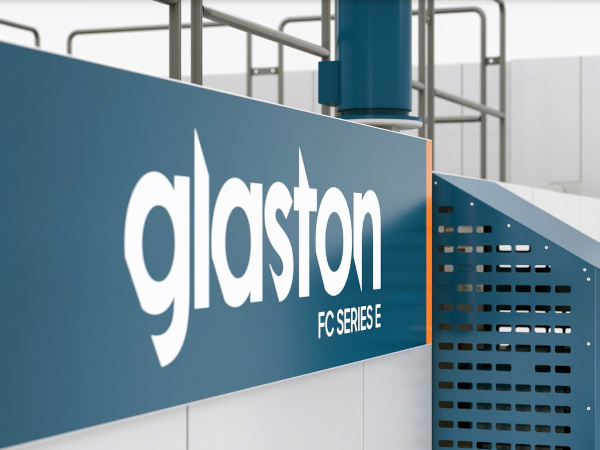

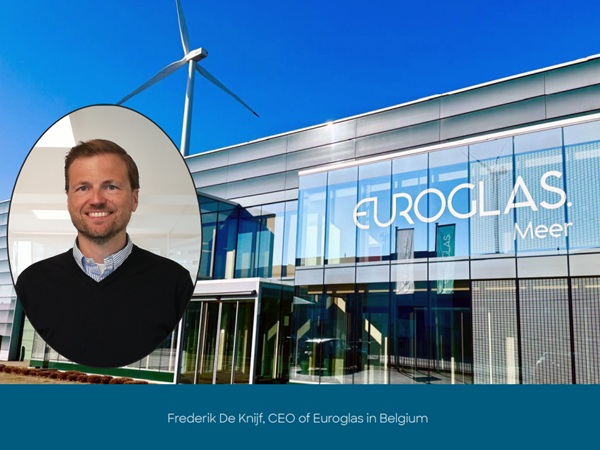


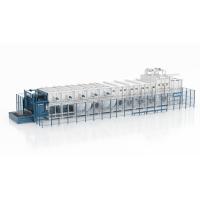

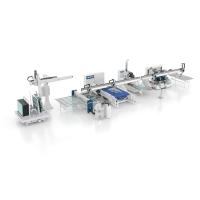
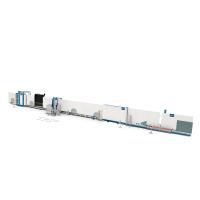
Add new comment